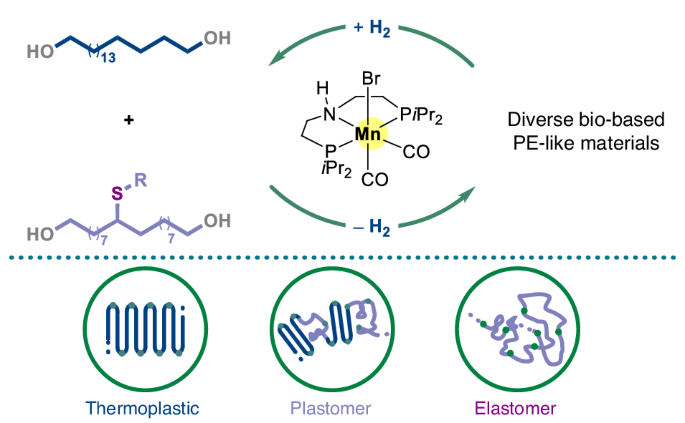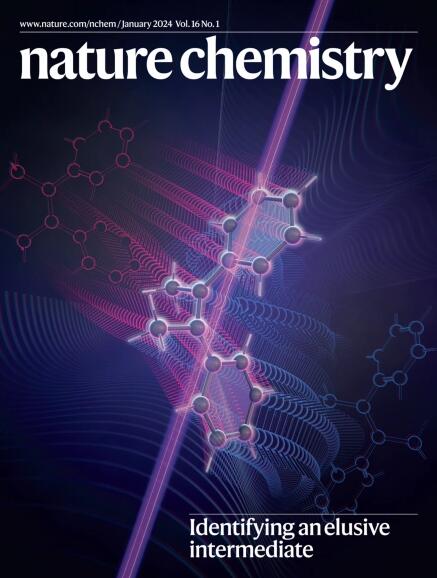生物衍生二元醇无受体脱氢聚合生成的聚乙烯类材料的催化闭环循环利用
IF 19.2
1区 化学
Q1 CHEMISTRY, MULTIDISCIPLINARY
引用次数: 0
摘要
石油衍生聚烯烃具有多种性能,是最重要和体积最大的一类塑料。然而,聚烯烃很难有效地回收或分解,现在是一个持久的全球性污染物。用生物衍生和可降解的类聚乙烯材料广泛取代聚烯烃是实现可持续塑料的一项重要但具有挑战性的努力。本文报道了一种以线性和支化二醇为原料,通过无受体脱氢聚合及其催化闭环回收合成环状生物基类聚乙烯材料的解决方案。聚合和解聚过程利用地球上丰富的锰配合物作为催化剂。这些材料表现出广泛的机械性能,包括热塑性塑料、塑性塑料和弹性体。支化二醇通过巯基咔嗒反应产生,可以聚合成具有显著增强拉伸性能、韧性和粘合性能的塑料。这些材料可以通过氢化解聚回单体,单体回收率高达99%,不受染料和添加剂的影响。总的来说,这个系统为更可持续的塑料开辟了一条道路。本文章由计算机程序翻译,如有差异,请以英文原文为准。


Catalytic closed-loop recycling of polyethylene-like materials produced by acceptorless dehydrogenative polymerization of bio-derived diols
Petroleum-derived polyolefins exhibit diverse properties and are the most important and largest volume class of plastics. However, polyolefins are difficult to efficiently recycle or break down and are now a persistent global contaminant. Broadly replacing polyolefins with bio-derived and degradable polyethylene-like materials is an important yet challenging endeavour towards sustainable plastics. Here we report a solution for circular bio-based polyethylene-like materials synthesized by acceptorless dehydrogenative polymerization from linear and branched diols and their catalytic closed-loop recycling. The polymerization and depolymerization processes utilize earth-abundant manganese complexes as catalysts. These materials exhibit a wide range of mechanical properties, encompassing thermoplastics to plastomers to elastomers. The branched diols, produced through a thiol–ene click reaction, can be polymerized to plastics with significantly enhanced tensile properties, toughness and adhesive properties. These materials could be depolymerized back to monomers through hydrogenation and were separatable with a monomer recovery of up to 99%, unaffected by the presence of dyes and additives. Overall, this system establishes a route to more sustainable plastics. Bio-based polyethylene-like materials with tunable thermal and mechanical properties have been synthesized from plant-derived diols using an acceptorless dehydrogenative polymerization strategy. Now it has been shown that this atom-economical and mass-economical approach employing non-precious metal catalysts enables closed-loop recycling and advances sustainable solutions for the circular plastic economy.
求助全文
通过发布文献求助,成功后即可免费获取论文全文。
去求助
来源期刊

Nature chemistry
化学-化学综合
CiteScore
29.60
自引率
1.40%
发文量
226
审稿时长
1.7 months
期刊介绍:
Nature Chemistry is a monthly journal that publishes groundbreaking and significant research in all areas of chemistry. It covers traditional subjects such as analytical, inorganic, organic, and physical chemistry, as well as a wide range of other topics including catalysis, computational and theoretical chemistry, and environmental chemistry.
The journal also features interdisciplinary research at the interface of chemistry with biology, materials science, nanotechnology, and physics. Manuscripts detailing such multidisciplinary work are encouraged, as long as the central theme pertains to chemistry.
Aside from primary research, Nature Chemistry publishes review articles, news and views, research highlights from other journals, commentaries, book reviews, correspondence, and analysis of the broader chemical landscape. It also addresses crucial issues related to education, funding, policy, intellectual property, and the societal impact of chemistry.
Nature Chemistry is dedicated to ensuring the highest standards of original research through a fair and rigorous review process. It offers authors maximum visibility for their papers, access to a broad readership, exceptional copy editing and production standards, rapid publication, and independence from academic societies and other vested interests.
Overall, Nature Chemistry aims to be the authoritative voice of the global chemical community.
 求助内容:
求助内容: 应助结果提醒方式:
应助结果提醒方式:


